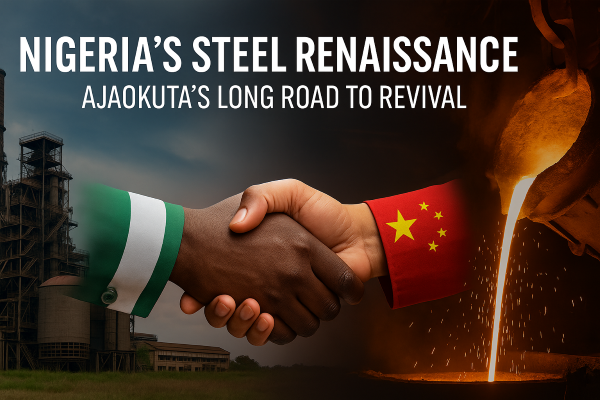Nigeria Eyes China Partnership to Revive Ajaokuta Steel, Unlock Industrial Future

As Russia’s war stalls earlier deal, FG explores strategic alliance to rebuild Nigeria’s steel backbone
Nigeria’s long quest to breathe life into its comatose steel industry may have entered a new phase as the Federal Government begins exploring a potential partnership with the People’s Republic of China to revive the Ajaokuta Steel Company Limited (ASCL) and the National Iron Ore Mining Company (NIOMCO) in Itakpe, Kogi State.
The announcement was made by the Minister of Steel Development, Prince Shuaibu Abubakar Audu, during the opening of the 10th edition of the Nigeria Mining Week, themed “Nigeria Mining: From Progress to Global Relevance”, held in Abuja.
This renewed drive signals the Tinubu administration’s determination to finally end the five-decade stalemate that has kept Nigeria’s most ambitious industrial project dormant—robbing the nation of the economic multiplier effects that a functional steel industry could deliver.
The Ajaokuta Promise and Russia’s Interrupted Revival
Prince Abubakar recalled that in September 2024, the Federal Government had signed a Memorandum of Understanding (MoU) with Messrs. Tyazhmashpromexport (TPE), the original Russian contractors who built the Ajaokuta plant, to rehabilitate, complete, and operate both ASCL and NIOMCO.
However, the outbreak of the Russia-Ukraine war froze the project, halting further engagement and creating an urgent need for alternative partners.
“Due to constraints arising from the ongoing war, we are now exploring a partnership with the Republic of China for the revitalisation of both ASCL and NIOMCO,” the Minister said.
“President Bola Tinubu will give the final approval based on financial, managerial, and technical competencies.”
The shift to China marks a pragmatic pivot in Nigeria’s industrial diplomacy—one that aligns with Beijing’s growing influence in Africa’s infrastructure and manufacturing landscape.
A Strategic Pivot: Why China Matters
China’s decades-long dominance in global steel production and its track record of financing large-scale industrial infrastructure through its Belt and Road Initiative (BRI) make it a natural partner for Nigeria’s steel ambitions.
Analysts say that beyond capital injection, the partnership could open access to technology transfer, equipment modernization, and capacity-building for local engineers, positioning Ajaokuta as a hub for West Africa’s metallurgical ecosystem.
With Ajaokuta’s revival, Nigeria could reduce its dependence on imported steel and aluminum products—saving billions in foreign exchange and fueling domestic industries such as construction, manufacturing, oil and gas, automotive, and defense.
Linking Steel to Security: Defence Industries Collaboration
In a strategic twist, the Minister revealed that the Steel Ministry is in advanced discussions with the Ministry of Defence and the Defence Industries Corporation of Nigeria (DICON) to manufacture components for military hardware at the Ajaokuta Engineering Workshop.
“This collaboration aims to produce inputs for rifles, vests, helmets, and bullets to support Nigeria’s defence sector and enhance national security,” Abubakar disclosed.
This initiative underscores the multi-sectoral role of steel as a foundation for industrial resilience and national sovereignty. From bridges to bullets, steel’s importance cuts across civilian and military applications—making its revival a matter of strategic urgency.
12 Iron Ore Deposits, One Ambitious Vision
To support the steel value chain, the National Steel Raw Materials Exploration Agency (NSRMEA) has identified 12 iron ore deposits across Nigeria that are now at different stages of exploration.
The Minister noted that data generation on key inputs—iron ore, coal, limestone, dolomite, refractory clay, and bauxite—is ongoing to attract investors and support large-scale industrial processing.
“Local steel production will drive massive consumption of raw materials within Nigeria and create ripple effects for job creation, mining communities, and ancillary industries,” Abubakar emphasized.
Industry analysts agree that a fully operational Ajaokuta-NIOMCO value chain could anchor Nigeria’s import substitution policy, while serving as the foundation for manufacturing exports to ECOWAS markets.
Private Sector Participation: The Missing Link
Prince Abubakar appealed to private investors attending the Nigeria Mining Week to view the steel raw materials value chain as an investment frontier.
“We are collaborating with critical stakeholders, especially the Ministry of Solid Minerals Development, to create the right environment for public-private partnerships,” he said.
Experts note that a fully liberalized and investor-driven steel industry could replicate the success stories of Dangote Cement and BUA Group in the building materials sector—driving down costs, deepening value addition, and improving Nigeria’s trade balance.
Policy Backbone: Repositioning Steel as Industrial Core
The Minister reaffirmed that the Federal Government’s renewed industrialization agenda aims to reposition steel as the nucleus of national growth, adding that robust business engagements and policy alignment around strategic minerals like iron ore, fluxes, and coal would anchor Nigeria’s reindustrialization.
“The top management of the Ministry of Steel Development and its agencies are here at this conference to show that the government is ready to provide the enabling environment for private investments to thrive,” he stated.
BRANDECONOMY Insight: Steel as the Barometer of Development
Globally, the health of a nation’s steel sector is considered a barometer of its industrial strength. Nigeria, once tipped to lead Africa’s metallurgical revolution, lags behind nations like Egypt and South Africa due to decades of policy inconsistencies, corruption, and underinvestment.
If fully revitalized, Ajaokuta Steel alone has the capacity to produce over 1.3 million tonnes of steel annually, creating an estimated 500,000 direct and indirect jobs and enabling Nigeria’s transition from a raw-material exporter to a manufacturing powerhouse.
Economists say the ripple effect would extend to housing, infrastructure, energy, and defence — all key pillars of the Renewed Hope Agenda.
Conclusion: Nigeria’s Steel Renaissance in View
The proposed China partnership offers a realistic pathway toward reviving Ajaokuta’s dream—one that has eluded successive administrations since the 1970s.
But beyond international partnerships, the success of this vision will depend on policy continuity, transparent governance, and local content integration to ensure that Nigeria’s steel renaissance translates into jobs, infrastructure, and national competitiveness.
The world is watching to see if Ajaokuta’s furnaces will finally burn again — not just as a monument to ambition, but as a symbol of Nigeria’s industrial rebirth.












